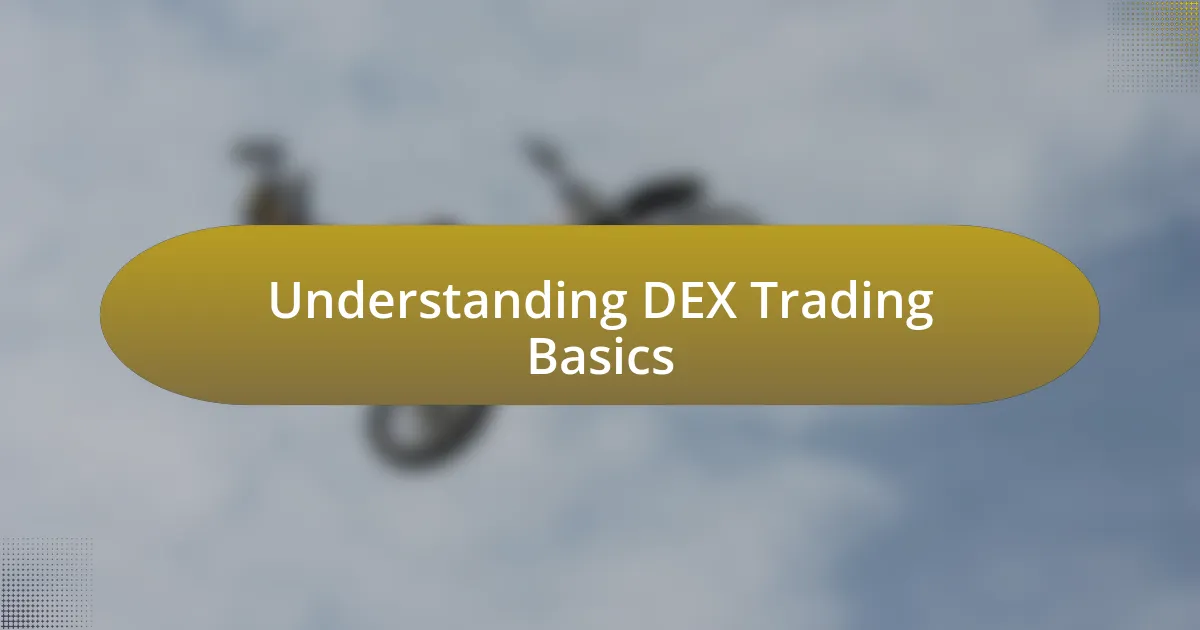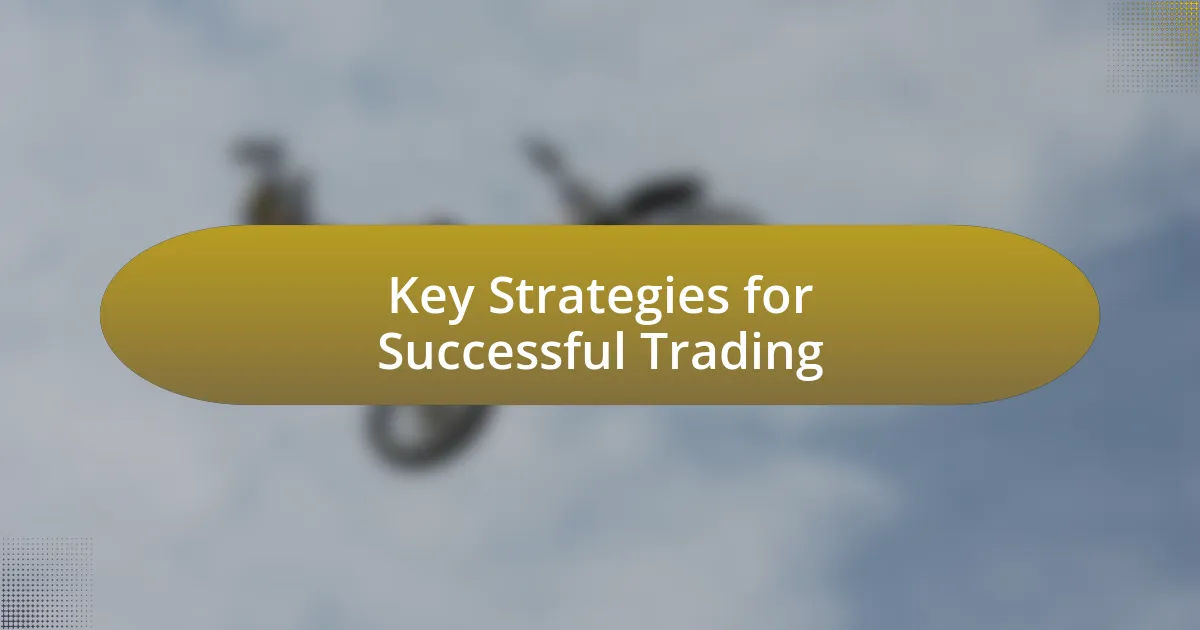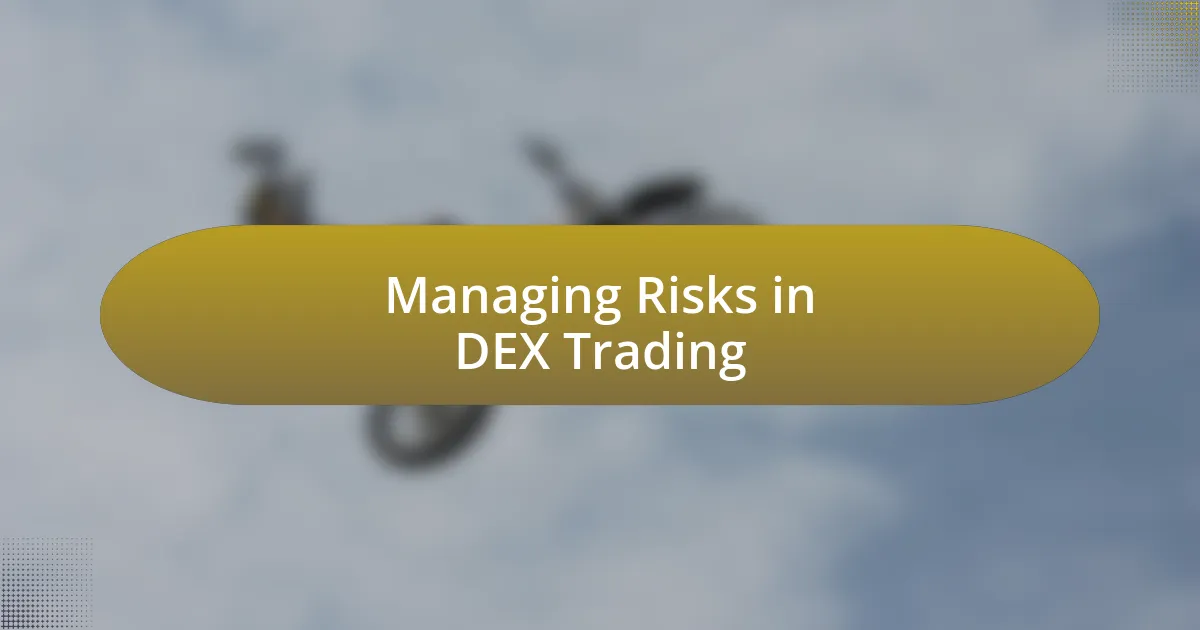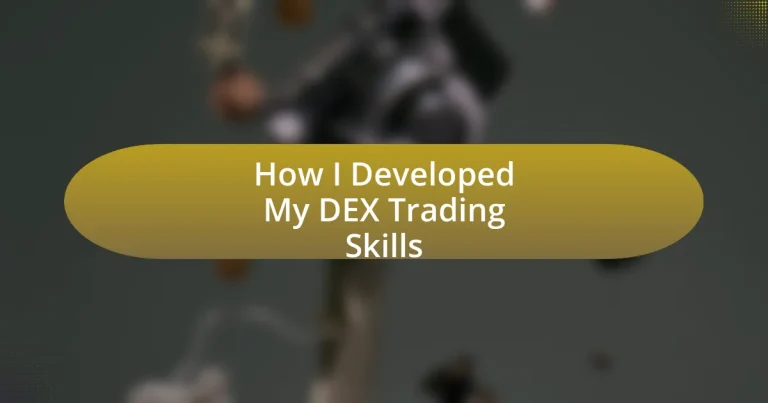Key takeaways:
- Understanding liquidity pools and their risks, such as impermanent loss, is crucial for successful DEX trading.
- Choosing a secure DEX platform with user-friendly features can enhance trading efficiency and ensure asset safety.
- Implementing disciplined trading strategies, including research, risk management, and emotional control, significantly improves trading outcomes.
- Continuous learning, community engagement, and journaling trades contribute to personal growth and better trading decisions.

Understanding DEX Trading Basics
When I first stumbled upon Decentralized Exchanges (DEX), I was intrigued by the idea of trading without intermediaries. The autonomy and flexibility felt empowering; I could make trades directly with other users. Have you ever experienced that liberating sense of control in a market? It’s quite unique.
The concept of liquidity pools was a revelation for me. I remember the first time I added liquidity to a pool and watched my tokens generate rewards. It’s fascinating how these pools provide the necessary liquidity that facilitates trading, yet they also come with risks like impermanent loss. Understanding these risks is crucial—after all, you want to ensure that your profits outweigh any potential losses.
I still vividly recall the confusion I felt while navigating through various DEX interfaces. The decentralized nature means that every platform has its quirks, and it can be overwhelming. Why does one platform allow certain tokens while another doesn’t? This uniqueness pushed me to explore and learn—transforming trade execution from a daunting task into an empowering skill set.

Choosing the Right DEX Platform
Choosing the right DEX platform was a bit of an adventure for me. The first thing I realized was that not all platforms are created equal. I remember spending hours researching various features, from transaction fees to the range of available tokens. I was eager to find a DEX that would cater to my trading needs and goals. I’ve learned that a well-rounded platform can make a world of difference in my trading experience.
Security was another major factor that guided my choice. I distinctly recall a friend sharing their story about a compromised account on a less secure DEX. That incident really opened my eyes to the importance of security features, such as multi-signature wallets and user control over private keys. I needed peace of mind, knowing that my assets were safe while trading in a decentralized environment.
After deliberation, I ended up using a platform that not only offered great liquidity but also had an intuitive interface. I vividly remember the first time I made a successful trade, feeling both a rush of excitement and a sense of accomplishment. It struck me that ease of use could significantly enhance my trading efficiency, making it essential to pick a DEX that feels right for me.
| Platform | Key Features |
|---|---|
| Uniswap | High liquidity, user-friendly interface |
| SushiSwap | Yield farming options, community-driven |
| PancakeSwap | Low fees, Binance Smart Chain compatibility |
| 1inch | Aggregates liquidity from multiple DEXs |

Key Strategies for Successful Trading
Successful trading requires a set of solid strategies tailored to navigate the dynamic landscape of decentralized exchanges. For me, a crucial aspect was developing a disciplined approach to trading. I remember my early days when I impulsively traded based on market hype, leading to regret rather than profits. It taught me the importance of having a clear plan, which includes setting entry and exit points based on thorough analysis rather than emotions.
Here are some key strategies that have guided me:
- Conduct Thorough Research: Stay updated on market trends and token information to make informed decisions.
- Develop a Trading Plan: Outline your goals, risk tolerance, and strategies before entering trades.
- Use Stop-Loss Orders: Protect your investments by setting predefined price levels to limit losses.
- Practice Risk Management: Only invest what you can afford to lose, to minimize the impact of bad trades.
- Stay Emotionally Detached: Avoid making decisions based on fear or greed; stick to your plan.
- Review and Adjust: Regularly assess your trades and strategies to identify what works and what doesn’t.
By implementing these strategies, I experienced a marked improvement in my trading outcomes, shifting from a fearful novice to a more confident trader. Each successful trade reinforced my belief in the value of strategic planning, shifting my mindset from reactive to proactive.

Managing Risks in DEX Trading
Managing risks in DEX trading requires a proactive mindset. I vividly remember a time when I neglected to set a stop-loss order on a trade that seemed promising. The market turned unexpectedly, and I watched helplessly as my investment dwindled. That experience drove home the importance of limiting potential losses before they spiral out of control.
I’ve also learned that diversification plays a key role in risk management. Early in my trading journey, I invested heavily in a single token, convinced of its potential. When it faltered, my portfolio took a significant hit. Now, I spread my investments across different projects and asset types, which cushions me against unforeseen volatility. Isn’t it interesting how spreading risk can also bring peace of mind?
Beyond financial strategies, emotional control has been a game-changer for me. It’s easy to get swept up in the excitement of a bull market or panic during a downturn. By maintaining a disciplined approach, I remind myself not to chase losses or let fear dictate my decisions. Having a clear plan has not only protected my capital but also helped me cultivate a more resilient trading mindset. What about you? How do you keep your emotions in check when the market takes unexpected turns?

Analyzing Market Trends Effectively
When I first started analyzing market trends, I often felt overwhelmed by the sheer amount of data available. I remember spending hours staring at charts and indicators, trying to decipher what they meant. It wasn’t until I focused on a few key indicators, like moving averages and volume trend analysis, that I began to see patterns emerge. Simplifying my approach not only saved me time but also improved my decision-making.
One of the most eye-opening moments came when I noticed how market sentiment can shift rapidly based on news events. I found myself caught in a selling frenzy sparked by a negative article, which prompted me to question my own instincts. By studying how similar news had affected price movements in the past, I developed a better understanding of the emotional reactions driving the market. Have you ever rushed into a trade based on a headline? Reflecting on those moments can teach valuable lessons about market psychology.
As I refined my skills, I discovered the significance of backtesting different strategies against historical data. This practice not only built my confidence but also helped me anticipate potential future movements. I often think about how different my trading would have been if I had relied solely on intuition. What strategies have you tried that made a lasting impact on your trading success? Each experience adds a layer to our understanding of the market’s ever-evolving nature.

Continuous Learning and Improvement Techniques
I’ve found that setting aside regular time for learning is crucial in honing my DEX trading skills. Each week, I dedicate a few hours to reading market analysis and exploring new trading strategies. This commitment not only expands my knowledge but also keeps me ahead of market developments, allowing me to adapt my approach as needed. Have you carved out time for your own learning?
Engaging with others in trading communities has been another powerful tool for my improvement. When I share my experiences and hear those of seasoned traders, it creates an atmosphere of mutual growth. I remember a specific instance where an insightful discussion about risk management opened my eyes to techniques I had overlooked. Are there people in your network who challenge your thinking or introduce new perspectives?
I’ve also embraced the practice of journaling my trades, which has been transformative. Recording my decisions, emotions, and outcomes helps me identify patterns and mistakes I might otherwise overlook. There’s something almost cathartic about revisiting my past trades and analyzing what worked and what didn’t. Have you ever reflected on your own trading journey and noted how you’ve evolved? This practice not only fosters accountability but also lays the groundwork for continuous improvement.

